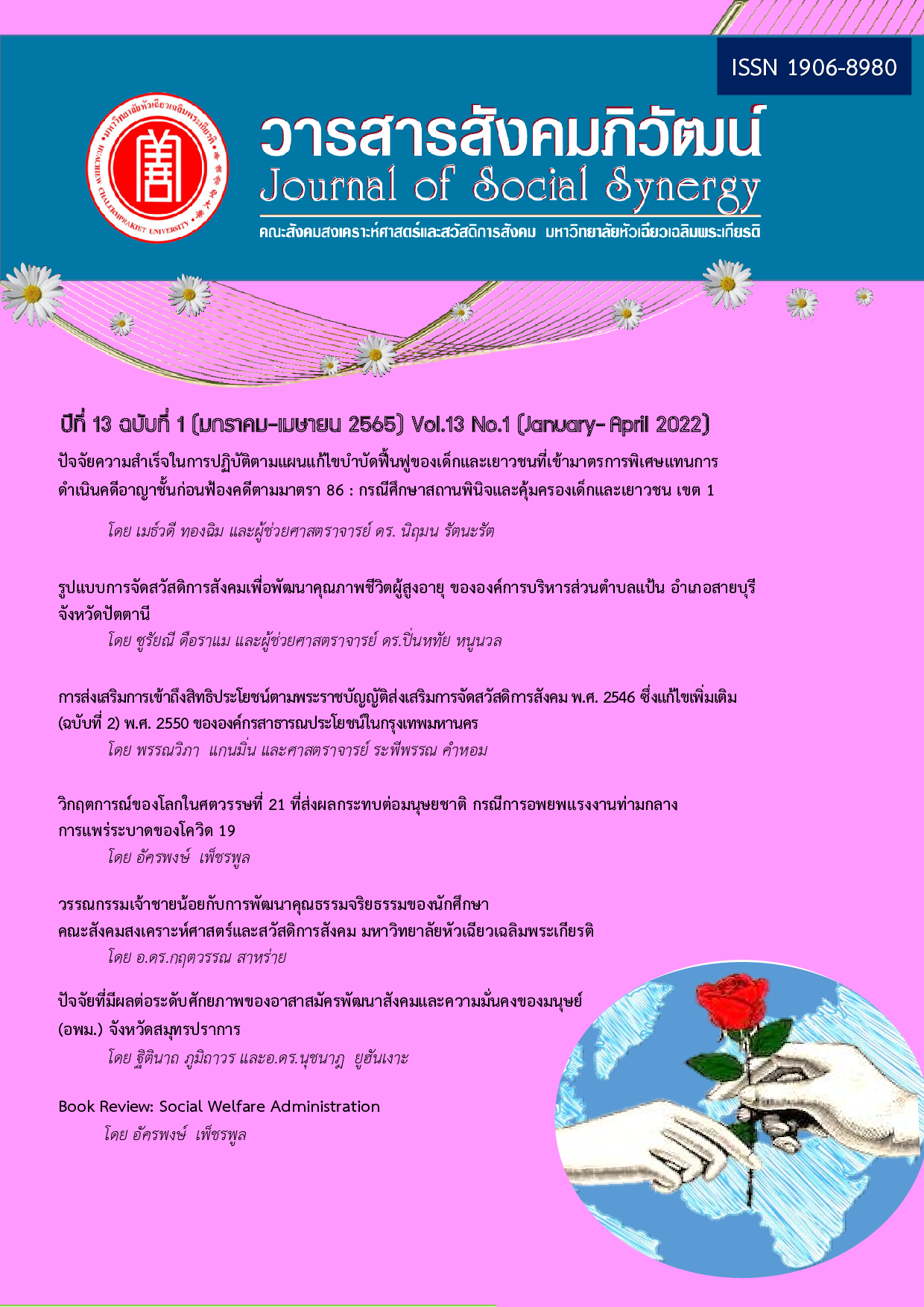Factors for success in implementing the rehabilitation program for children and youths who have taken special substitutive measures in lieu of prosecuting criminal proceedings before prosecution under Section 86: Case Study of Juvenile Observation and Pr
Keywords:
special substitutive measures in lieu of prosecuting criminal proceedings before prosecution under Section 86, implementation of the rehabilitation programAbstract
Factors for success in implementing the rehabilitation program for children and youths who have taken special substitutive measures in lieu of prosecuting criminal proceedings before prosecution under Section 86: Case Study of Juvenile Observation and Protection Center, District 1 consists of many objectives: to study the factors affect the success of implementing the rehabilitation program for children and youths, and to study the guidelines of the rehabilitation program for children and youths who have taken special substitutive measures instead of criminal prosecution before prosecution under Section 86, which is consistent with the current problem and individual environmental factors concerning children or youths. It is a mixed research with the quantitative study by questionnaires. The data is collected data from 173 children and youths who are being rehabilitated and be successful from the program. Data were analyzed by statistical values; percentage, mean and standard deviation. In the qualitative part, a structured interview was used to collect data from 33 persons involved in the creation of the rehabilitation program under Section 86.
The results of the study found most of the children and were males (91.9%), average age 16.17 years old. They were prosecuted for offenses related to the Road Traffic Act 2019 (45.1%). The program duration for their implementation in the program was up to 4-6 months ( 64.7%) Overall, the external factors affect the success in the program implementation of children and youths at a high level, in that the officer's performance is the highest level (mean=4.33), and the internal factors is in the high level, respectively. In terms of relationship, it is the highest factor (mean = 3.72). Also, the result was found that key informants had consistent opinions on staff performance.
The results of the study found the suggestions based on data from 33 persons involved in the creation of the rehabilitation program under Section 86 as follow. The extension of the penalty rate of cases that can meet the criteria, improving the judicial criteria that can be carried out under Section 86, considering the length of time for the implementation of the children and youths rehabilitation program, applying Individual Routing Counselor (IRC) model, aligning the process with the current situation, update operation Manual, and regularly develop knowledge and understanding to those involved in the implementation of Section 86.
References
กรมพินิจและคุ้มครองเด็กและเยาวชน กระทรวงยุติธรรม. (2563). คู่มือปฏิบัติงานมาตรการพิเศษแทนการดำเนินคดีอาญาฉบับปรับปรุงแก้ไข. (พิมพ์ครั้งที่ 2). กรุงเทพมหานคร: กรมพินิจและคุ้มครองเด็กและเยาวชน.
คณะผู้พิพากษาศาลเยาวชนและครอบครัวกลาง. (2563). มาตรการพิเศษแทนการดำเนินคดีอาญาหลังฟ้องคดี:คู่มือมาตรการพิเศษแทนการดำเนินคดีอาญาตามมาตรา 90. (พิมพ์ครั้งที่ 1). กรุงเทพมหานคร: สกายบุ๊กส์.
ชัชวาล สงวนพันธุ์. (2560). มาตรการพิเศษแทนการดำเนินคดีอาญา : ศึกษาเงื่อนไขการหันเหคดีในชั้นก่อนฟ้อง. (วิทยานิพนธ์ปริญญามหาบัณฑิต). มหาวิทยาลัยธุรกิจบัณฑิตย์,คณะนิติศาสตร์ปรีดี พนมยงค์.
ณฐพร โตประยูร. (2550). การนำกระบวนการยุติธรรมเชิงสมานฉันท์มาใช้ในกระบวนการยุติธรรมสำหรับเด็กและเยาวชน.(วิทยานิพนธ์ปริญญามหาบัณฑิต). มหาวิทยาลัยธรรมศาสตร์,คณะสังคมสงเคราะห์ศาสตร์.
ธีนพันธ์ ก๋ำดารา. (2559). ปัญหาการให้ความยินยอมในการใช้มาตรการพิเศษแทนการดำเนินคดีอาญาของเด็กและเยาวชน. (วิทยานิพนธ์นิติศาสตรมหาบัณฑิต). สถาบันบัณฑิตพัฒนบริหารศาสตร์, คณะนิติศาสตร์
นิศรา รัตนเกียรติกานต์. (2558). มาตรการพิเศษแทนการดำเนินคดีอาญา : ศึกษาการมีส่วนร่วมของผู้แทนชุมชนในการจัดทำแผนแก้ไขบำบัดฟื้นฟูในชั้นก่อนฟ้อง. (วิทยานิพนธ์นิติศาสตรมหาบัณฑิต). มหาวิทยาลัยธุรกิจบัณฑิตย์, คณะนิติศาสตร์ปรีดี พนมยงค์.
ปพนธีร์ ธีระพันธ์. (2561). แนวทางการพัฒนาการเบี่ยงเบนคดีในชั้นสอบสวนที่เด็กและเยาวชนเป็นผู้กระทำความผิด. วารสารนิติศาสตร์, 47 (2), 373. สืบค้นเมื่อวันที่ 17 กรกฎาคม 2563
จาก https://so05.tci- thaijo.org/index.php/tulawjournal/article/view/196263/136429
ปุณยวัจน์ ไตรจุฑากาญจน์. (2561). แนวทางการพัฒนากระบวนการแก้ไขบำบัดฟื้นฟูเด็กและเยาวชนของผู้ปฏิบัติงานที่เกี่ยวข้องกับกระบวนการยุติธรรมเด็กและเยาวชน. วารสารธรรมศาสตร์, 37(2), 71.
ลลิตา ปนุตติกร. (2555). กระบวนการยุติธรรมเชิงสมานฉันท์ในชั้นก่อนฟ้อง : ศึกษาในชั้นการสั่งคดีของพนักงานอัยการ. (วิทยานิพนธ์นิติศาสตรมหาบัณฑิต). มหาวิทยาลัยธรรมศาสตร์,คณะนิติศาสตร์.
Downloads
Published
How to Cite
Issue
Section
License
Copyright (c) 2022 Journal of Social Synergy

This work is licensed under a Creative Commons Attribution-NonCommercial-NoDerivatives 4.0 International License.
บทความที่ได้รับการตีพิมพ์เป็นลิขสิทธิ์ของวารสารสังคมภิวัฒน์ มหาวิทยาลัยหัวเฉียวเฉลิมพระเกียรติ
ข้อความที่ปรากฏในบทความแต่ละเรื่องในวารสารวิชาการเล่มนี้เป็นความคิดเห็นส่วนตัวของผู้เขียนแต่ละท่านไม่เกี่ยวข้องกับมหาวิทยาลัยหัวเฉียวเฉลิมพระเกียรติ และคณาจารย์ท่านอื่นๆในมหาวิทยาลัยฯ แต่อย่างใด ความรับผิดชอบองค์ประกอบทั้งหมดของบทความแต่ละเรื่องเป็นของผู้เขียนแต่ละท่าน หากมีความผิดพลาดใดๆ ผู้เขียนแต่ละท่านจะรับผิดชอบบทความของตนเองแต่ผู้เดียว




